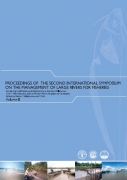Mekong River Commission
Proceedings of the second international symposium on the management of large rivers for fisheries by FAO and Mekong River Commission
Posted on 03 Feb, 2011 07:55 PM The second international symposium on the management of large rivers for fisheries was held by the Food and Agriculture Organisation of the United Nations (FAO) and Mekong River Commission on 11 - 14 February 2003 in Phnom Penh, Kingdom of Cambodia. It had three primary objectives: (a) To provide a forum to review and synthesise the latest information on large rivers; (b) To raise the political, public and scientific awareness of the importance of river systems, the living aquatic resources they support and the people that depend on them; and (c) To contribute to better management, conservation and restoration of the living aquatic resources of large rivers.
The second international symposium on the management of large rivers for fisheries was held by the Food and Agriculture Organisation of the United Nations (FAO) and Mekong River Commission on 11 - 14 February 2003 in Phnom Penh, Kingdom of Cambodia. It had three primary objectives: (a) To provide a forum to review and synthesise the latest information on large rivers; (b) To raise the political, public and scientific awareness of the importance of river systems, the living aquatic resources they support and the people that depend on them; and (c) To contribute to better management, conservation and restoration of the living aquatic resources of large rivers.
The symposium was organised in six sessions:
Session 1: Status of rivers
Session 2: Value of river fisheries
Session 3: Fisheries ecology and conservation
Session 4: Management of river fisheries
Session 5: Statistics and information
Session 6: Synthesis
It came up with the following recommendations for action -
- Improve the valuation of living river resources in order to contribute to equitable and sustainable management of fishery resources and properly place the fishery in the context of the other uses of rivers.
- Direct greater effort to better understanding the social and economic aspects of fisheries to support policy and management priorities; livelihood approaches will be a valuable tool.
- Communicate and engage with environment and water resources managers within the context of multi-use of water in order to accurately assess impacts and to sustain the benefits of river fisheries in an equitable manner.
- Develop processes that facilitate the users and beneficiaries of the fishery resource to assume greater control of its management.
- Establish appropriate mechanisms at national and basin level to enable negotiation for the needs of communities dependent upon the living aquatic resources. In particular further regulations need to be elaborated to protect general ecosystem function and provide for environmental flows.
- Use instruments such as the freshwater eco-regions approach, the Ramsar Convention and the guidelines for water allocation suggested by the World Commission on Dams, to enhance planning for conservation and sustainable use of river habitats.
- Incorporate ecological flow requirements of river-floodplain systems into development plans and impact assessments that affect river flows, taking into account the seasonality of the system and the environmental cues needed by the fish for migration and reproduction.
- Rehabilitate degraded ecosystems wherever possible. Prioritize schemes that ensure connectivity and protection of critical habitats.